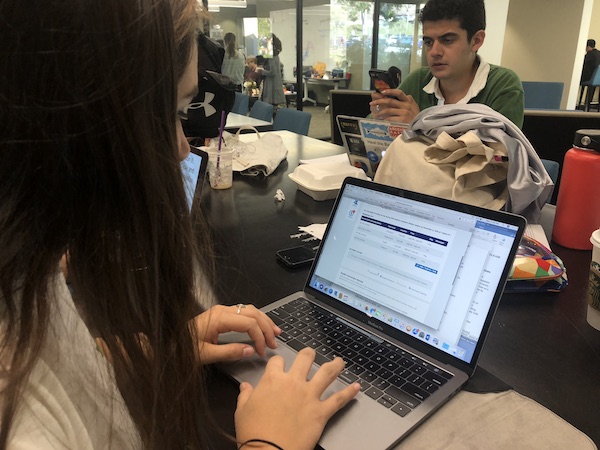
One second.
One single second can change whether a student gets into his or her classes.
A Pepp Post survey of 53 students found that students faced a range of difficulty in registering for their classes, with most finding the experience at least semi-stressful on a scale of one to five, with five being the most difficult. Student interviews showed that most students had difficulty getting the classes they needed at some point in their Pepperdine career.
“Everytime I click that button, my heart breaks into a billion pieces knowing all my hardwork went down the drain,” said Kennadie McDermott, senior integrated marketing communication major.
McDermott has regularly not gotten her classes and spends a lot of time figuring out her course schedule to make sure she graduates on time.
Registration is a very stressful time for students, faculty, divisional deans, divisional office managers and OneStop staff. Divisional deans plan course schedules a semester in advance, hoping to meet student need.
Students consult OneStop, look at their Degree Audit Reports and create four-year plans to prepare. OneStop and faculty offer academic advising, deal with academic and financial holds, and place students on waitlists. Administrators said many efforts are made to insure that students get into the classes they need but some are unlucky and slip through the cracks.
Students voice their opinions
The Pepp Post survey found that nearly 59 percent of students found conflicting class times a problem in getting the classes they needed.
Junior economics major Jonathan Word initially found conflicting class times a problem for his major.
“All my classes are in the late afternoon every year,” he said.
He realized that Pepperdine offers a lot of Wednesday classes that don’t conflict with the typical Monday-Thursday and Tuesday-Friday scheduling.
Word also found an 8 a.m. that he could take. He wasn’t a fan of the time but knew he had to take the class.
The Pepp Post survey found that 72 percent of students have dealt with classes they needed being already full when they tried to register for them.
The survey found that roughly half of those students eventually got the classes they need.
The four-year plan
The Pepp Post survey found that 73 percent of students surveyed had four-year plans, 15 percent didn’t and 11 percent were not sure.
Divisional deans stressed the importance of four-year plans and encouraged all students to make one with their major adviser.
“I always make my students make a four-year plan,” said Robert Williams, the divisional dean of the Social Science Division.
The Pepperdine Registrar also offers forms online as a guide. Each student has a Degree Audit Report (DAR) which include all major, minor and general education classes a student needs to graduate.
Students use four-year plans for long-term academic planning. These plans are not concrete, as classes are interchangeable as problems arise.
When students change their majors, four-year plans are necessary to help students figure out what classes they need.
Junior economics major Josh Ortega found it hard to create a four-year plan when he switched from business administration to economics. Before switching, he needed to assess whether he could graduate on time by looking at required classes and fitting them into his four-year plan. He researched on his own because he had emailed his advisor in the past and got no response.
Cary Krumdieck, junior media production major, tried to get help but her advisers kept leaving the university.
“My advisor has changed three times,” Krumdieck said.
Her four-year plan has changed every time she got a new advisor, leaving her with a lot of confusion.
“I am without a plan right now,” Krumdieck said.
She is currently working with her third advisor to create one.
Hannah Nanri, junior interpersonal communication major, found her four-year plan hard to fix when she was abroad in Lausanne, Switzerland. She and other students in her program had a problem when two required general education religion courses were offered during the same semester and students could not overlap. As part of her four-year plan, she depended on taking both abroad and had to make adjustments when she arrived back in Malibu.
Some students run into few issues getting their classes, but when they do, they use their four-year plan to find other alternatives.
Junior psychology major Jesse Hancock never had a problem while registering. Despite not getting all the classes he wants, he moves around his four-year plan to fit the classes that are available.
“For the week of registration, it is like my bible,” he said.
Sometimes adjusting took a few minutes and sometimes it took a lot longer than that, Hancock said.
The Pepp Post survey found that 79 percent of students got the classes they needed, though not always at the time they wanted.
Balancing major classes and GEs
Pepperdine students have 19 general education (GE) requirements.
Students should take a mix of major classes and GEs to balance out their schedules, said Sarah Stone Watt, divisional dean of the Communication Division.
Certain classes also need to be taken in order. It is impossible to take all major classes at once because there are prerequisites, where one class leads to another, Stone Watt said.
“Knowledge is scaffolded,” she said.
When students are not able to get all their major classes, they add GEs to fill up their schedule.
“It is impossible to get all of my classes,” said Veronica Lempert, junior rhetoric and leadership major.
She is currently enrolled in three major classes and two GEs.
Despite not getting all the classes she wants, she is on track for graduation. When she didn’t get her major classes, she changed her four-year plan so she could take GEs instead.
Divisional deans are here to help
Divisional deans make class schedules each semester and take many factors into consideration, including professor availability, classroom availability, number of students in their major, what classes are required, etc.
Divisional deans schedule some high demand classes every semester, some once a year. For certain electives, “every other year is OK,” Williams said.
Some classes are also only taught in either the fall or the spring but this is strategically done so students take classes in order, Stone Watt said.
Williams tries to examine which classes are full and add extra sections if he can.
“There are many exceptions of course, such as President Benton’s class in political science,” Williams said.
Dean Baim, the divisional dean of the Business Administration Division, also adds classes when there is a demand for it but said he only does so when he finds qualified professors to fill the classes.
“Opening up a class and putting 10-12 students in a new section is not going to help the student if it is a lousy class,” he said.
Divisional deans also consider the schedules of the students. Stone Watt tries to offer 8 a.m. classes so that athletes can make it to afternoon training. For some majors, internships are required and so morning classes are preferable so that students can go to work in the afternoon.
Certain majors such as media production and advertising have a number of nighttime classes because divisional deans invite people from the field to teach.
One advertising professor commutes from San Diego, Stone Watt said.
“His knowledge is so valuable that we need to accommodate to his schedule,” she said.
Pepperdine has a unique system where any block classes, which are three to four hours long, can only happen on a Wednesday afternoon or at night. Despite being an inconvenience to students, it becomes easier for divisional deans to plan schedules.
Divisional deans understand the problems students have and give them a plan B: summer classes.
“Summer classes are available for those who do not get into needed classes,” Lucas Salcedo, senior student services advisor at OneStop said.
What OneStop has to offer

OneStop is the focal point for many departments on campus. Students can talk about financial aid, student accounts, academic advising, any type of transcript request, enrollment activity, drops/withdrawals, Salcedo said.
The university gives many different options to students to help them fix their course conflicts. Based on the survey, around 24 percent of students said they went to OneStop with problems.
Registering
Registration is prioritized. NCAA athletes, students from Office of Student Accessibility, veteran students and the debate team all register first. Students then register based on the number of units they have, with seniors getting first pick.
Registration give seniors priority to help them graduate.
“Every year, registering for classes becomes a little bit easier,” McDermott said.
Despite popular conceptions, waitlists are not based on who’s at the top of the list.
Stone Watt said she prioritizes and figures out what students “need” the class most.
There is no priority list and it is taken on a “case by case basis,” Salcedo said.
Divisional deans have the power to add students into classes when necessary.
“If there is one student who has a compelling reason why he/she has to take that class that term we will do what we can to get that student in,” Baim said.
Liam Labrooy completed the reporting for this story under the supervision of Dr. Christina Littlefield and Dr. Theresa de los Santos in Jour 241 in spring 2018. Dr. Littlefield supervised the web story.



